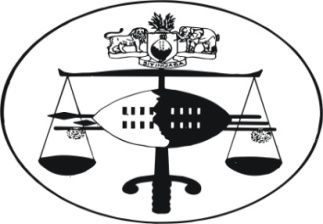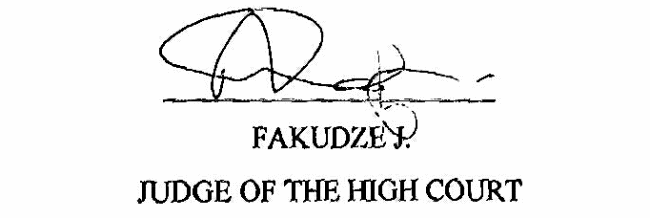
IN THE HIGH COURT OF ESWATINI
JUDGMENT
Case No. 122/15
In the matter between:
REX
V
SAMKELISO SKUTA MNDZEBELE
Neutral citation: Rex V Samkeliso Skuta Mndzebele [122/15] [2019] SZHC 98 (11th June, 2016)
Coram: FAKUDZE, J
Heard: 6th June, 2019
Delivered: 11th June, 2019
Summary: Criminal law – Extenuating factors found in the form of provocation; low level of education and that the accused was under the influence of dagga – Factors to take into account in sentencing considered – Accused’s conduct heinous and attrocious – Sentenced to Twenty Three (23) years imprisonment – Sentence backdated to the accused’s date of arrest.
JUDGMENT ON EXTENUATION AND SENTENCE
[1] The accused was charged with the offence of murder and the court has accordingly found him guilty as charged.
[2] The court is now called upon to determine the issue of extenuation and sentence.
EXTENUATION
[3] In S.V. Letsolo 1970 (3) SA 476 A.D at 476 F-H Holmes well defined extenuating circumstances as follows:
“Extenuating circumstances have more than once been defined by this court as any fact bearing on the commission of the crime which reduces the moral blameworthiness of the accused, as distinct from his legal culpability. In this regard the trial court has to consider:
Whether there are any facts which might be relevant to extenuation such as immaturity, intoxication or provocation (the list is not exhaustive);
Whether such facts, in their cumulative effect, probably had a bearing on the accused’s state of mind in doing what he did;
Whether such bearing was sufficiently appreciable to abate the moral blameworthiness of the accused in doing what he did.
In deciding (c), the trial court exercises a moral judgment. If the answer is yes, it expresses its opinion that there are extenuating circumstances.”
[4] In the Botswana Court of Appeal Case of Fly V The State (CLCLB – 099 - 08 [2012) BWCA, at paragraph 35, Dr. Twum J.A. added a further factor which may be considered as extenuating. The Learned Judge said:
“low education, coupled with a rustic background may do!”
[5] The usual practice in this jurisdiction is to conduct an inquiry on the existence or otherwise of extenuating circumstances immediately after conviction but before mitigation. See Rex V Sibusiso Kunene and Another 25/14 [2014] SZHC 348 (September 2014).
[6] In Daniel Dlamini V Rex Criminal Appeal No. 11/98, it was stated that the onus to prove the existence of extenuating circumstances no longer rest with the accused; it rests with the court and its officers – counsel – to enquire as to the presence or absence of extenuating circumstances.
[7] Turning to the case at hand, when the offence was committed, provocation seems to have had a hand. The accused pointed out that when he passed by the deceased’s homestead, the deceased uttered certain words which caused the accused to be angry. This had to do with the raiding of the accused’s dagga fields by the police. This clearly appears in the confession the accused made before the Judicial Officer. The Crown has not disputed this part of the evidence. This court is inclined to find provocation as an extenuating factor. Further, with regard to the excerpt from the Fly Judgment (Supra), it is this court’s view that the accused was afflicted with low education having not gone beyond Grade 7. He is a person of low intelligence, limited education and is an unsophisticated person from the rural areas of Ngwempisana in Mankayane.
[8] The issue of the accused’s state of mind also came up in the confession. The accused did mention that he had smoked saga when he passed by the deceased’s place. He was therefore not in his sober senses. The Crown did not challenge this part of the accused’s evidence. This factor also serves as an extenuating circumstance.
[9] I am therefore of the considered view that extenuating circumstances, being provocation, low education and that the accused was under the influence of drugs are applicable with respect to the present case. I pronounce this opinion as required by Section 295 (1) of the Criminal Procedure and Evidence Act, 1938. I now proceed to deal with the question of sentence.
SENTENCE
[10] The accused was convicted of the crime of murder on the 27th November, 2018. In arriving at the appropriate sentence, this court will take into account the seriousness of the offence, the interests of the society and the personal interests of the accused. In the case of Chicco Manyanya Iddi and Two Others V Rex Criminal Appeal No. 03, 09 and 10/20 Moore J.A. stated what is expected of a trial court when sentencing. The Learned Judge said at pages 27 to 28:-
“A sentence must consider:
The penalties and other forms of treatment prescribed by the Legislature;
The circumstances of the case;
The circumstances of the offender; and
The interests of the society at large.
Under the above broad heading, the court must also consider such factors, inter alia,
The evidence in mitigation;
The effect of the offence upon the victim and the community;
Whether the offender made repatriation or has compensated the victim;
The effect which the sentence may have upon continuing relationships.
The prevalence of the crime at the time of its commission;
The potential for inflicting harm upon the innocent and the vulnerable; and
Its potential for undermining the integrity of the society and its officials.”
[11] The factors that favour the accused have been well articulated by his counsel and the court has taken them into account in arriving at the appropriate sentence. First, the accused is a first offender with no previous record of conviction. Second, the accused co-operated with the police. He pointed out the relevant items which were used in the commission of the offence. Third, the accused was remorseful such that the accused’s family contributed a substantial amount towards the burial costs of the deceased. Last, the accused was Twenty One years (21) old when he committed the offence. He was therefore relatively young.
[12] With respect to those that favour the society, the accused committed a very serious offence. The deceased was brutally killed over dagga fields that were near her homestead. The fields had been burnt down by the police. Many lives have been lost as a result of dagga dealings in the country. Dagga dealers must come to realise that human life is more important than dagga. Courts must therefore mete out sentences that will be a lesson not only to the accused person but to other would be offenders.
[13] As far the offence is concerned, the killing of the deceased was heinous and brutal. The deceased was deprived of her right to life without a reasonable or justifiable cause. She was a mother, a wife and a daughter in law in her family. All these relatives will never recover from the effects of this crime. The crime was also committed within the deceased’s family yard. The deceased suffered injuries on her body and the most fatal ones were directed at her head and they were five (5) in number. According to the post mortem report, the head injuries led to the death of the deceased.
[14] In the case of Rex V Samukelo Madati Tsela, Case No. 166/2008, Hlophe J. rightly observed at paragraph 8 of His judgment as follows:
“I had no doubt that society expect courts to deal effectively with matters of the killings of human beings by others which is not only prevalent but is on the rise. It was for this consideration that the sentence I would give should not end up being too low so as to lead to members of the public losing confidence in the justice system. In this regard, the sentence I imposed took into account considerations of deference.”
[15] In imposing a sentence, the court should take into account the sentencing trend by our courts in similar matters as well as the circumstances of the matter at hand. Based on all above mentioned considerations, I am of the view that a sentence that fits you in the light of the seriousness of the crime and the interests of society is that of Twenty Three (23) years imprisonment without an option of a fine. The fact that an innocent person was killed should weigh heavily on the accused’s conscience for the rest of his life. The sentence is backdated to the date of the accused’s arrest.

REX: N. MASUKU
DEFENCE: N. NDLANGAMANDLA
9